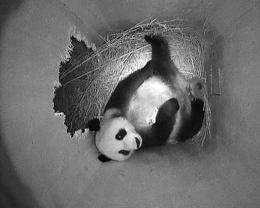A picture released by the Vienna Schoebrunn Zoo and taken on August 23, shows female panda Yang Yand holding the right paw. A new panda has been born in Vienna's Schoenbrunn Zoo, the second to be conceived naturally there, the zoo said.
Another panda has been born in Vienna's Schoenbrunn Zoo, the second in Europe to be conceived naturally in captivity, the zoo said Tuesday.
The 10-year-old mother, Yang Yang, who made history on August 23, 2007, by giving birth to Fu Long -- Europe's first panda to be naturally conceived in captivity -- gave birth a second time on Monday afternoon after around four hours in labour, the zoo said in a statement.
The new baby, whose sex cannot yet be determined, was born exactly three years to the day after Fu Long, who was returned to China last year.
As was the case with Fu Long, Yang Yang was actually carrying two babies, but the second did not survive, said the zoo's expert Eveline Dungl.
"Female pandas usually find a second baby too much and unfortunately we couldn't save it," Dungl told the Austrian news agency APA.
The surviving panda weighs around 100 grammes (0.2 pounds) and measures 10-12 centimetres (four-to-five inches) and will remain in the litter box with its mother for the next few months.
Both the mother and the new baby were in good health and Yang Yang was letting her cub suckle, Dungl said.
The zoo's panda house will remain closed to visitors for the time being to ensure the animals have absolute peace and quiet.
Zoo chief Dagmar Schratter expressed "great joy" at the news, but cautioned: "The mortality rate among Great Pandas in the first year is around 40 percent."
It was therefore a tradition in China that the animals are named only 100 days after their birth, because not only the immediate post-birth period was dangerous, but the first teething as well, zoologist Dungl said.
Mating of pandas in captivity is extremely difficult, since females are only fertile three or four days a year.
Dungl suggested a number of factors had made the two successful births possible in Vienna.
"Firstly, it must be said that Yang Yang and her mate Long Hui are a wonderful couple, who harmonise well, even though pandas are usually loners," the expert said.
But the animals' pen was optimal and the zoo was very careful about the pandas' diet, she added.
Fu Long -- "Lucky Dragon" in Mandarin -- was the second panda to be born in Europe and one of only a few worldwide to be conceived naturally in captivity.
Under the zoo's contract with China, however, Fu Long had to return to his country of origin on his second birthday.
Pandas, even when conceived abroad, are the property of the Republic of China and only loaned to foreign zoos.
Less than 1,600 giant pandas remain in the wild, according to a 2006 China panda report.
Earlier this month, Schoenbrunn hit the headlines with the birth of a baby elephant, called Tuluba, who has already become a hit with visitors.
(c) 2010 AFP
























